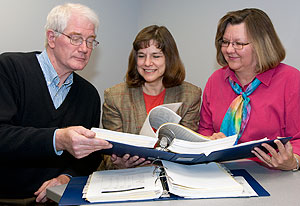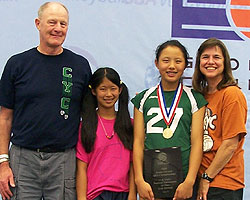Virginia Buckles, Ph.D., is a consummate team player. Whether talking about what she enjoys at the office or on her own time, she tends to bring up the pleasures of working with other talented teammates.

Buckles, 57, has played volleyball since she was 11, and her love for the game centers on the cooperative nature of the sport.
“You can’t showboat in volleyball like you can in many other team sports,” Buckles says. “You need everyone else, so it’s the ultimate team sport.”
Buckles speaks with similar admiration of the confluence of talents that she helps bring together at the Alzheimer’s Disease Research Center (ADRC), where she has been executive director for 10 years.
“It’s just the most amazing place to do research,” says Buckles, research associate professor of neurology. “Hardly anyone ever says, ‘That’s not my job,’ and, if you need it, people are there to help.”
Interestingly enough, Buckles’ teams tend to be winners. Her volleyball team placed first or second nationally in the past three Senior Olympics, and researchers at the ADRC are perpetually winning grants and prizes and producing papers that are leaders in scientific citations.
To John C. Morris, M.D., the Harvey A. and Dorismae Hacker Friedman Distinguished Professor of Neurology and director of the ADRC, the correlation is no mystery.
“Virginia is very much invested in the work the team does and how we do it,” he says. “She cares very much and wants us to be the best. I was very lucky to find her.”
Finding John Morris
Buckles, who has an infectious, easy-to-provoke laugh, jokes that “all roads led to John Morris” when she first came to St. Louis in 1991. Her husband, Jim, had just been transferred from teaching Army ROTC classes at the University of Southern California (USC) to an appointment at the Army’s National Personnel Records Center in St. Louis.
At the time, Buckles was finishing postdoctoral work at USC at the Ethel Percy Andrus Gerontology Center at the Davis School of Gerontology. She began her career in science studying learning and control of movement and earned a doctorate in those topics at the University of Wisconsin-Madison. But she had also developed an interest in aging at that time and investigated the extent to which ideas from experiments with college students could be applied to the elderly.

At the Davis School, then one of the few gerontology schools in the nation, Buckles collaborated with a retired dean and a member of the psychology faculty to study attention and aging.
“It’s kind of a leap, but there is a link,” she says, laughing. “Several of the cognitive tasks in learning movement overlap with those involved in attention.”
In St. Louis, Buckles wrote to Martha Storandt, Ph.D., professor of psychology in Arts & Sciences, to ask if Storandt could recommend anyone who studied aging and movement. Storandt suggested Morris, who at the time had a new grant to study the topic.
At about the same time, a new volleyball teammate at the Jewish Community Center also recommended touching base with Morris. She did, and, in 1992, Buckles started working with Morris, initially analyzing data to prepare it for publication. She gradually took on more and more responsibilities until she became executive director of the ADRC in 1999.
The position involves a variety of different research administration tasks, from gathering the required contributions for a 450-page grant renewal from various ADRC faculty and sending it on its way to facilitating collaborations with international researchers. Morris recently won funding for a project called the Dominantly Inherited Alzheimer’s Network, which seeks to learn more about Alzheimer’s disease from the rare inherited forms of the disorder and partners the ADRC with other similar centers in the United States, England and Australia.
“There are little details that you never think about until the international effort gets running, like whether the test licensing agreements we acquired in the United States are valid in other countries,” she says. “And then there’s the whole issue of what to do about a test question that asks subjects how many quarters there are in $6.75, or picture tests that ask the subject to identify an object that’s not commonly recognized overseas.”
Buckles loves the “do-it-yourself” mentality that prevails at the ADRC, noting that she keeps a toolbox in her office and installed her own shelves.
“We’ve done some reupholstering of our exam tables, as another example, or gone to warehouse clearances to pick up furniture for the waiting room at bargain prices,” she says. “You’ll notice that not everything matches, but that’s because we try to be good stewards and make our funds go a long way.”
When she has time, Buckles has been an active member of research teams. She most recently was the lead author on a paper focused on issues of informed consent and dementia.
“We wanted to take a look at how researchers can ethically factor complex issues of consent into the degree of dementia being experienced by a patient,” she says. “Sometimes we have to turn to family members or others who are legally able to give a proxy consent, but we can’t be too quick to dismiss the subject. If they have the capacity to make the decision about their participation, then we have to respect that decision.”
In recent years, though, the ever-expanding research programs of the ADRC have kept Buckles too busy for her own research.
“It’s almost unheard of for one person to be in charge of four major grant programs, as John is, and to be such a wonderful director dedicated to doing things the right way and the best way,” she says. “I get tired just thinking about how much he does.”
Team, family challenges
Off the job, Buckles is getting ready to take her volleyball team to the national Senior Olympics again. She jokes that recruitment and retention can sometimes be the biggest challenges for the team.
|
Virginia Buckles |
|
Born in: Savannah, Ga. Raised in: Glendale, Calif. Likes to read: Fantasy and science fiction, including Ray Bradbury, Robert A. Heinlein, Larry Niven and Frank Herbert Favorite recent read: The “Inkheart” trilogy by Cornelia Funke Favorite place to visit with the girls: City Museum Favorite radio shows: “Car Talk,” “Whad’ya Know?” and “Wait Wait … Don’t Tell Me!” on NPR |
“When you recruit, you always have to ask how old they are, and women of a certain age don’t like that much,” she says. “Also, you have to qualify for nationals a year ahead of time, and it’s hard to keep an older team healthy that long. Knees are always going bad, arthritis flaring up, backs getting hurt. But we took first nationally in 2003 and second in 2005 and 2007, and we’re headed back this summer.”
Buckles says that her team doesn’t have to practice because “at our age, you know all the offenses and defenses and can put them together.” In any event, she needs that time to nurture the next generation of the Buckles volleyball dynasty: daughters Emma, 13, and Amy, 12. Buckles and her husband, Jim, now the sheriff of St. Louis County, adopted the girls from China in the 1990s.
Both girls initially were involved in volleyball and basketball, her husband Jim’s favorite sport, but the increasing time commitments required to play in competitive leagues eventually forced them to pick one sport, and, to Buckles’ delight, they chose volleyball. They keep a busy competitive schedule that takes them from tournament to tournament for most of the school year. National competitions at the Junior Olympics are in the summer, often around the same time as the Senior Olympics.
“In 2007, I had to go from the Junior Olympics to the Senior Olympics because they were overlapped in time,” Buckles says. “And it was so funny to go from the junior competition, where you have 12- to 18-year-olds in spandex, and then you go to the senior games, and there’s a lot of gray hair and — thank goodness! — no spandex.” At the 2008 junior competition, Emma’s team won first nationally.
Buckles said she thinks everyone should have a “lifetime sport” and faults contemporary physical education classes for not turning kids on to an athletic passion they can pursue all their lives.
“Today most people go to the gym to work out, but my response is, hello, that’s called work for a reason: It’s boring!” she says. “If you give me a choice between work and play, I’d much rather play.”